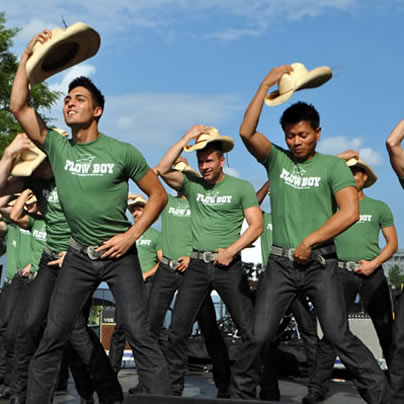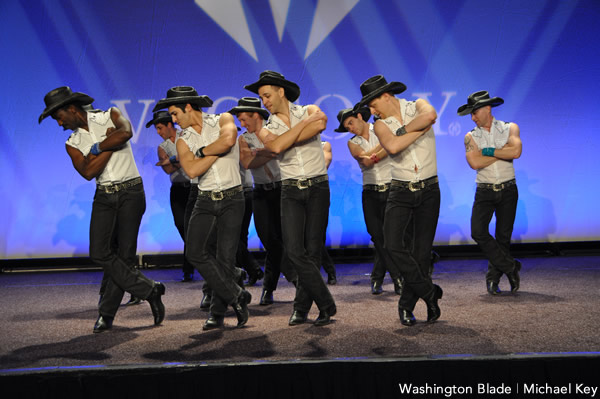Arts & Entertainment
Pride entertainers
Diverse group of acts slated to be on the main stage


Look for the D.C. Cowboys’ farewell performance this summer at Capital Pride. (Blade file photo by Michael Key)
Blade staff spoke with several performers slated to appear on the Capital Pride festival stage Sunday. Here are some of the highlights.
Headliner Deborah Cox remembers performing at Capital Pride once before. The heat is what stands out in her mind. When she’s not traveling — she guesses she’s on the road about 70 percent of the time — she enjoys spending time with her husband and three children (ages 8, 5 and 3). As one might imagine, she loves classic R&B and says she owns every album Michael Jackson, Stevie Wonder and Aretha Franklin ever released. She’s exploring more jazz — Billie Holiday, Ella Fitzgerald — these days.
She plans a 30-minute set at Capital Pride.
“I always research what songs did well in certain markets so it will be a custom show,” she says. “And it will be fierce.”
Crystal Waters’ newest single, “Le Bump,” with Yolanda Be Cool, was released in 2011.
STAY ON TOP OF ALL THINGS PRIDE! DOWNLOAD THE DIGITAL PRIDE GUIDE TODAY!
Overall, Waters has 16 No. 1 and top 10 singles in more than 15 countries. She had two other songs make the Billboard Hot 100, “What I Need” and “Say … If You Feel Alright.” She had several other songs hit the U.S. Dance charts, including five number ones.
Waters was nominated for three American Music Awards in 1991, an MTV Video Music Award and four Billboard Music Awards in 1994, winning Top-Selling Hot Dance Music Club Play Single for “100% Pure Love.”
The D.C. Cowboys are prepared for an emotional final Capital Pride appearance.
Founder Kevin Platte — one of this year’s Pride heroes — isn’t sure where or when the final performance will be, he says this is “absolutely” their last time at Capital Pride.
“I just want folks to remember us as a group that left smiles on the faces of people who watched us,” Platte says. “We’ve always had such a good time doing it, we just want to make sure we’ve passed that on to our fans and the people in the audience as well.”
Alma Tropicalia is also slated to perform.
“The LGBT Community has seen some great victories this year and D.C. Pride is a great way for us to celebrate that,” says gay member Bill Dempsey. “Alma Tropicália is all about recognizing diverse backgrounds, so playing at Pride makes a lot of sense for us artistically.”
The band released its first recording in April — a self-titled EP available for digital download. Expect big percussion and a mix of styles at the band’s Pride performance.
“Life is a journey,” says hunky gay singer Aiden Leslie, another Pride singer. “And I am expressing this journey through my music.”
Leslie has never performed in D.C. and is looking forward to rocking it out and kicking off an exciting summer. He will be starting off his time in Washington with a special performance with Pepper MaShay at Secrets. He is also planning on debuting a new single on the Capital Pride stage along with three other songs.
Ani Hesse, 13, has been attending pride events with her two moms, Dana and Dale, for as long as she can remember, but this year’s Capital Pride marks the first time that she will be part of the entertainment.
“I’m so excited,” says Ani. “I love performing for big audiences. I can’t wait.”
Crys Matthews performed at Capital Pride last year, but this year’s performance will have a special significance: her fiancée will be in the audience. Matthews and her partner recently became engaged and plan to marry in 2013.
She thanks the organizers of Capital Pride for the chance to perform for D.C.’s LGBT community again and for the incredible work they do in “bringing our diverse community together.”
Simulover is two out performers: famous DJ and producer Alex Lauterstein and singer and producer SIRPAUL. Lauterstein and SIRPAUL think of themselves as “partners in crime.” They met 12 years ago when Lauterstein was the first DJ to play SIRPAUL’s song. They always knew they wanted to work together and when they finally got their schedules synced Simulover was born.
“It is time to go beyond labels,” SIRPAUL says. “It’s not gay marriage, it is marriage, and it isn’t ‘cute that you are married’; It’s what two people who love each other do.” SIRPAUL recently married his husband Paul and feels strongly about eliminating the labels that hold our community back.
Both Lauterstein and SIRPAUL have been involved in the gay community and culture for years and the community and culture influences their music. They believe they have something to offer everyone and hope to see a large D.C. crowd at their Pride performance.
Xavier Toscano loves Pride festivals because they give the community a chance to get together and celebrate our lives and our accomplishments. It is not all about the glitz and glamour but instead about living our lives and being happy with ourselves.
Toscano, who was afraid of performing early on has now overcome many of those fears, although right before he gets on stage he is going through his performance in his head, and “hoping he doesn’t forget his lyrics,” which he shyly admitted to doing early on in his career. He promised to not forget his lyrics for Capital Pride and put on an amazing show.
At last year’s Capital Pride, Consuelo Costin performed in front of about 400,000 people. “I had a great time. With the pulse, the drive, the energy, being around such diversity all celebrating one cause, was a memorial experience.” Costin says.
She’s straight but staunchly supports the gay community because she feels strongly about equality and people being who they are. Costin will be back for this year’s D.C. pride, bringing another awesome show. She’ll also perform at Los Angeles Pride.
Out & About
Plan your wedding the LGBTQ way
Washington D.C. LGBTQ+ Wedding Expo scheduled for Sunday

Rainbow Wedding Network will host “Washington D.C. LGBTQ+ Wedding Expo” on Sunday, March 1 at 12:30 p.m.
Guests can meet and mingle with a curated selection of LGBTQ-welcoming wedding professionals from across the region, each ready to help bring your vision to life, and spend a beautiful afternoon exploring everything they need to create a celebration that reflects them.
There will be a relaxed, self-guided look at the Watergate’s spaces and amenities, savor signature cocktails and delicious tasting samples, and connect with other couples who are on the same journey.
Visit Eventbrite to reserve a spot.

Friday, February 27
Center Aging Monthly Luncheon With Yoga and Drag Bingo will be at 12 p.m. at the DC Center for the LGBT Community. Email Mac at [email protected] if you require ASL interpreter assistance, have any dietary restrictions, or questions about this event.
Go Gay DC will host “LGBTQ+ Community Happy Hour Meetup” at 7 p.m. at Freddie’s Beach Bar and Restaurant. This is a chance to relax, make new friends, and enjoy happy hour specials at this classic retro venue. Attendance is free and more details are available on Eventbrite.
Trans Discussion Group will be at 7 p.m. on Zoom. This group is intended to provide an emotionally and physically safe space for trans people and those who may be questioning their gender identity/expression to join together in community and learn from one another. For more details, email [email protected].
Saturday, February 28
Go Gay DC will host “LGBTQ+ Community Brunch” at 11 a.m. at Freddie’s Beach Bar & Restaurant. This fun weekly event brings the DMV area LGBTQ+ community, including allies, together for delicious food and conversation. Attendance is free and more details are available on Eventbrite.
The DC Center for the LGBT Community will host “Sunday Supper on Saturday” at 2 p.m. It’s more than just an event; it’s an opportunity to step away from the busyness of life and invest in something meaningful, and enjoy delicious food, genuine laughter, and conversations that spark connection and inspiration. For more details, visit the Center’s website.
Black Lesbian Support Group will be at 1 p.m. on Zoom. This is a peer-led support group devoted to the joys and challenges of being a Black lesbian. You do not need to be a member of the Beta Kappa Chapter or the Beta Phi Omega Sorority in order to join, but they do ask that you either identify as a lesbian or are questioning that aspect of your identity.Send an email to [email protected] to receive the zoom link.
Sunday, March 1
LGBTQ+ Community Coffee and Conversation will be at 12 p.m. at As You Are. This event is for people looking to make more friends and meaningful connections in the LGBTQ community. Attendance is free and more details are available on Eventbrite.
Monday, March 2
“Center Aging: Monday Coffee Klatch” will be at 10 a.m. on Zoom. This is a social hour for older LGBTQ+ adults. Guests are encouraged to bring a beverage of choice. For more information, contact Adam ([email protected]).
Tuesday, March 3
Universal Pride Meeting will be at 7 p.m. on Zoom. This group seeks to support, educate, empower, and create change for people with disabilities. For more details, email [email protected].
Wednesday, March 4
Job Club will be at 6 p.m. on Zoom upon request. This is a weekly job support program to help job entrants and seekers, including the long-term unemployed, improve self-confidence, motivation, resilience and productivity for effective job searches and networking — allowing participants to move away from being merely “applicants” toward being “candidates.” For more information, email [email protected] or visit www.thedccenter.org/careers.
Center Aging Women’s Social and Discussion Group will be at 6 p.m. on Zoom. This group is a place where older LGBTQ+ women can meet and socialize with one another. There will be discussion, activities, and a chance for guests to share what they want future events to include. For more information, email [email protected].
Thursday, March 5
The DC Center’s Fresh Produce Program will be held all day at the DC Center for the LGBT Community. People will be informed on Wednesday at 5 p.m. if they are picked to receive a produce box. No proof of residency or income is required. For more information, email [email protected] or call 202-682-2245.
Virtual Yoga Class will be at 7 p.m. on Zoom. This free weekly class is a combination of yoga, breathwork and meditation that allows LGBTQ+ community members to continue their healing journey with somatic and mindfulness practices. For more details, visit the DC Center’s website.
a&e features
Transmission DC breathes new life into a storied sound space
A fresh home for boundary-pushing culture on H Street

Late last year, phoenix-style, a fresh home for boundary-pushing culture arose on the H Street corridor. Transmission DC – a queer, trans, and POC-owned, operated, and centered community-focused venue – powered on in the former home to the Rock & Roll Hotel (famously, not a hotel, but very much rock & roll). Transmission (1353 H St., N.E.) arrives secure in its mandate – or even birthright – to provide a place to celebrate creativity and music through a lens of inclusivity and respect.
Transmission’s team brings experience, but also representation. Owners/partners Kabir Khanna (who is also programming director), Katii B, Ellie McDyre, and Kelli Kerrigan together previously managed 618 productions, a venue in Chinatown, crafting “some of D.C.’s freakiest parties, raves, and mosh pits” they note.
They packed up operations last fall to a space curated specifically for D.C.’s underground music and culture scene, building their efforts in Chinatown to bring in more fans in queer and POC circles.
Transmission, Khanna points out, is built on DIY values. In the music scene, DIY means that promoters and organizers – often disconnected from the mainstream and part of marginalized communities – build shows and programs collaboratively, but independently from institutions, supporting each other as smaller, independent venues close. Here, Transmission aims to ensure that those putting together these underground inclusive shows have a more permanent and stable home, can have access to resources, and can provide more sustainable income to artists. “We’re trying to get more people to support and enjoy the music, and also give artists and organizers within the DIY community more structure and a larger cut,” says Khanna.
Khanna also notes that Transmission operates “under the principles of safety, inclusivity, and respect.” McDyre added that even at venues that claim inclusivity, that statement might not take place in practice. We’re “not just pitting up a rainbow flag,” says McDyre, but as some of the owners are trans and POC, audiences can see themselves reflected at the top.
Much like the DIY nature of the music community, the Transmission owners brought a DIY ethos to turning around their space.
In March 2020 – the height of COVID lockdowns – Rock & Roll Hotel suddenly shuttered, though not due to the pandemic; instead, the venue claimed that decreasing sales and increasing competition led to the closure. For 14 years, it was the central spot for cheap beer and lesser-known and celebrated acts. The space stood vacant for more than five years, until Transmission turned the power back on.
“When we got into the space, it was effectively abandoned for years,” says Khanna. “There was a ton of mold, and paint primer covering all surfaces. It was nearly falling apart.” Khanna noted that many music venues like this one, regardless of how well it was maintained, “get the shit kicked out of it,” given the nature of shows. The team called in mold removal contractors, ripped up most of the floorboards, and started fresh.
Transmission’s first floor is styled as a stripped-down black box: the better to take in the music. “It’s minimal on purpose to act as a canvas for set design and music,” without a specific aesthetic, says Khanna. Moving upstairs, the second floor has been opened up, removing some walls, and now has a larger dance area than the first floor. Beyond the first two performance levels, and a holdover from Rock & Roll Hotel, is the rooftop. Though without a stage, the rooftop space is filled with murals splashed across the walls, with a full bar. Transmission’s current capacity is 496, but the team is looking to grow that number. Transmission will also leverage the full kitchen that Rock & Roll Hotel operated, bringing in Third Hand Kitchen to offer a variety of food, including vegan and vegetarian options.
Khanna pointed out an upcoming show reflective of Transmission’s inclusive ethos: Black Techo Matters on Feb. 27. The event is set to be “a dynamic, collaborative night of underground electronic music celebrating Black History Month.” Khanna says that techno came from Black music origins, and this event will celebrate this genesis with a host of artists, including DJ Stingray 313, Carlos Souffront, and Femanyst.




















